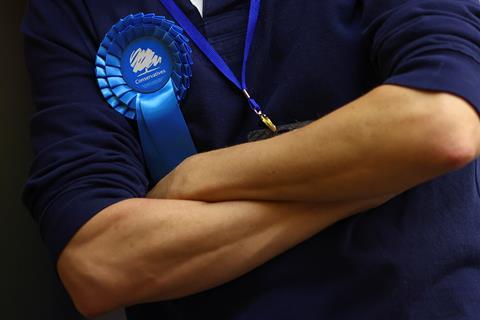Evangelical Alliance polling suggests believers are matching shifts in the general population and tacking towards the Labour Party

The recent local elections were in many ways a warm-up for the main event. All of the UK will be going to the polls soon in a general election, which must be called by January 2025 at the latest. In the same way that Rishi Sunak’s Conservatives suffered a bruising night in council and mayoral elections, they are widely expected to be dumped out of office in Westminster too. More and more Britons are abandoning the Tories, and the latest research by the Evangelical Alliance (EA) suggests that same pattern is evident among Christians.
The Thinking faithfully about politics report shows that believers are matching shifts in the general population and tacking towards the Labour Party. The EA’s survey of 1,380 self-described evangelical Christians showed 42 per cent planned to vote Labour in the upcoming election, compared to 29 per cent Conservative and 16 per cent Liberal Democrat. A further 5 per cent intend to vote for the Greens and another 5 per cent for Reform.
These figures broadly reflect national polls, although evangelicals are still slightly more likely to vote for the Tories (who languish at 23 per cent in the polls) and the Lib Dems, and less likely to vote for Reform.
Highly engaged
But one way in which believers do stand out politically is their engagement. Turnout at general elections in recent years has been between 60 and 70 per cent, but 94 per cent of the Christians surveyed by the EA said they were certain or very likely to vote. One in ten said they were members of a party or actively campaigning, vastly higher than the 1.5 per cent of the general population.
Evangelicals are also more likely than average to contact their local MP or councillor, boycott a product for political or ethical reasons and donate money to a campaign. In fact, the only political act those surveyed were less likely than wider society to take part in was joining a demonstration or picket line.
While evangelicals’ party preferences broadly lined up with the wider public, their differing values shine through much more clearly when it came to particular policies. The EA survey asked the respondents what policies would make them more or less likely to vote for a party, and the results which came back provide a fascinating insight into what agitates and exercises Christians in 2024.
Among the policies most favoured were protection for free speech in the workplace, opposition to assisted suicide, reducing the time limit on abortions, protecting single-sex spaces, backing more legal asylum routes, and increasing the minimum wage. The policy most likely to lose the Christian vote? Leaving the European Convention on Human Rights. As the EA report notes: “This is not a portfolio of policy preferences that neatly maps onto any party platform.”
What motivates believers to vote is helping those most in need. Almost six in ten of those surveyed said this was the in their top three considerations when they picked up their pencil in the polling booth. Next most popular was whether a party or platform was aligned with scripture (54 per cent), followed by what would best manage the economy (48 per cent). Only one in ten said they voted for the party who they thought would best benefit themselves.
Politics matters
Andy Flannagan, the director of Christians in Politics, said he had found his job of enthusing believers to vote, campaign and stand for election much easier this time round after years of crisis. “There was a percentage of people for whom our relative prosperity insulated us from government decision-making. But in the course of the last five, six, seven years, that really hasn’t been the case. People are now more than ever starting to realise that it really, really matters who leads us.”
And many churchpeople, deeply involved in social action such as foodbanks or debt counselling, had been drifting towards Labour, Hannah Rich, director of Christians on the Left, added. “To stereotype, but you have lovely middle-class Christians who if they weren’t in the church would never have met an asylum seeker or met someone on benefits, who now really understand the frustrations of all of that. And so are really motivated and see first-hand the impact of current government policy.”
People are starting to realise that it really, really matters who leads us
One interesting shift since 2014, when the EA last ran a similar survey, was the growing emphasis placed on character, not just policy. “Evangelicals see the integrity of political leaders, upholding Christian values and creating unity as some of the most important issues facing our nation,” the report concludes. “There has been a shift since 2014, when the focus of evangelicals was policy issues and not values.” This perhaps reflects some of the political chaos and rolling crises over the last decade, with repeated changes of prime minister, vicious political infighting and endless scandals. Many of those surveyed spoke of a longing for more unity and less division in British politics, perhaps through more proportional voting systems or a more diverse range of parties represented in parliament.
Confidence in politicians remains very low – just 12 per cent said they trusted politicians, although even that rock bottom figure is marginally higher than the general population. Less than one in four said the UK’s political system worked well, too, and even fewer (31 per cent) said they were hopeful about the future of our country.
The director of the Liberal Democrat Christian Forum, Elizabeth Jewkes, said she was “desperate” for the church to get stuck into politics this election year to try and rebuild integrity and character in politics after Brexit and partygate. “The way I see it is that the biggest problem we’ve got is a lack of trust.”
And yet despite the disillusionment, Christians remain firmly committed to our democratic system regardless of its manifold flaws and weaknesses. An astonishing 93 per cent said that more believers should get involved in party politics and stand for election. And when considering the statement “The church should concentrate on preaching and teaching the gospel and leave political issues to the politicians”, just one in five respondents agreed.
But David Burrowes, a former Tory MP who now serves with the Conservative Christian Fellowship (CCF), said Christians should resist the “lazy” idea all politicians were the same and inherently untrustworthy. “I think there is a tendency for Christians to be good at getting involved in single issues, moral issues, social justice issues – but less good at getting involved in the messy compromising area of party politics,” he said. He conceded his party had gone through “challenging times” with a string of scandals, but said the CCF should not just be there to “throw the stone and judge”, but also to pastor those who have “mucked up”, being “full of grace in a political world that doesn’t have much of it”.
“The results of our survey revealed there’s appetite for more engagement in politics, but also distrust of politicians and frustration with political parties,” commented Danny Webster, director of advocacy at the EA. “Ahead of the general election, we want to see evangelical Christians praying for politics, equipped to think and vote faithfully, and to build relationships with candidates that will last far beyond election day.”






































2 Readers' comments